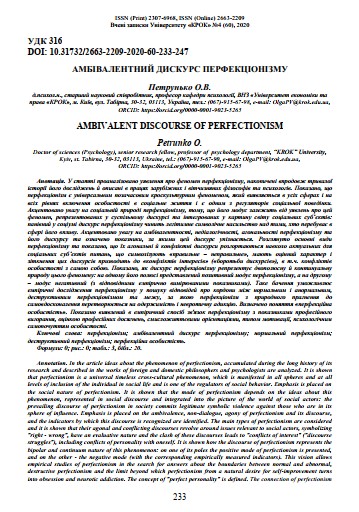AMBIVALENT DISCOURSE OF PERFECTIONISM
DOI:
https://doi.org/10.31732/2663-2209-2020-60-233-247Keywords:
perfectionism, ambivalent discourse of perfectionism, normal perfectionism, destructive perfectionism, perfect personalityAbstract
In the article ideas about the phenomenon of perfectionism, accumulated during the long history of its research and described in the works of foreign and domestic philosophers and psychologists are analyzed. It is shown that perfectionism is a universal timeless cross-cultural phenomenon, which is manifested in all spheres and at all levels of inclusion of the individual in social life and is one of the regulators of social behavior. Emphasis is placed on the social nature of perfectionism. It is shown that the mode of perfectionism depends on the ideas about this phenomenon, represented in social discourse and integrated into the picture of the world of social actors: the prevailing discourse of perfectionism in society commits legitimate symbolic violence against those who are in its sphere of influence. Emphasis is placed on the ambivalence, non-dialogue, agony of perfectionism and its discourse, and the indicators by which this discourse is recognized are identified. The main types of perfectionism are considered and it is shown that their agonal and conflicting discourses revolve around issues relevant to social actors, symbolizing "right - wrong", have an evaluative nature and the clash of these discourses leads to "conflicts of interest" ("discourse struggles"), including conflicts of personality with oneself. It is shown how the discourse of perfectionism represents the bipolar and continuum nature of this phenomenon: on one of its poles the positive mode of perfectionism is presented, and on the other - the negative mode (with the corresponding empirically measured indicators). This vision allows empirical studies of perfectionism in the search for answers about the boundaries between normal and abnormal, destructive perfectionism and the limit beyond which perfectionism from a natural desire for self-improvement turns into obsession and neurotic addiction. The concept of "perfect personality" is defined. The connection of perfectionism with indicators of professional burnout, assessment of professional achievements, meaningful life orientations, type of motivation, psychological well-being of the person revealed in an empirical way is shown.
Downloads
References
Conrad Ch. Agon and rhetorical form: The essence of “old feminist”. Communication Studies, 1981. Vol. 32 (1), Рp. 45–53.
Адлер А. Практика и теория индивидуальной психологии. Москва : Директ-Медиа, 2008. 406 c.
Хорни К. Невротическая личность нашего времени. Москва: Прогресс, 1993. 389 с.
Silverman L. K. A developmental model for counseling the gifted II Counseling the gifted and talented. Denver, 1993. P. 14–30.
Hollender M. Perfectionism. Compr. Psychiatry, 1965. V. 6. Pр. 94-103.
Гаранян Н. Г. Перфекционизм и психические расстройства (обзор зарубежных эмпирических исследований). Современная терапия психических расстройств. 2006. № 1. С. 31–41.
Гуляс І.А. Психологія перфекціонізму. Чернівці: Прут, 2010. 272 с.
Barrow J., Moore C. Group interventions with perfectionistic thinking. Personnel and Guidance Journal. 1983. V. 61. Pр. 612–615.
Холмогорова А. Б., Гаранян Н. Г. Нарциссизм, перфекционизм и депрессия. Московский психотерапевтический журнал. 2004. № 1. C. 18–35.
Hewitt P., Flett G., Donovan C. Perfectionism and suicide potential. British. Journ. of Clin. Psychol. 1992. V. 31. P. 181–190.
Ильин Е. П. Работа и личность. Трудоголизм, перфекционизм, лень. СПб.: Питер, 2011. 224 с.
Бек А. Когнитивная психотерапия расстройств личности. СПб. : Питер, 2002. 544 с.
Карпенко З. С. Перфекціонізм у структурі мотивації професійної діяльності особистості. Вісник Прикарпатського університету. Філософські і психологічні науки. 2004. Вип. VI. С. 131–134.
Бурдье П. Социология социального пространства: Пер. с франц.; отв. ред. перевода Н. А. Шматко. М. : Институт экспериментальной социологии; СПб.: Алетейя, 2007. 288 с.
Кочубейник О. М. Соціальний діалог: соціальні та психологічні передумови комунікативності. Наукові студії із соціальної та політичної психології. 2014. №34 (37). С.150–160.
Peters S. Perfectionism: different views. N.Y.: Pergamon. 2001. Pр. 66–90.
Тал Бен-Шахар. Парадокс перфекциониста. Москва : «Манн, Иванов и Фербер», 2013. 256 с.
Грачева И. И. Адаптация методики «Многомерная шкала перфекционизма» П. Хьюитта и Г. Флетта. Психол. журн. 2006. Т. 27, № 6. С. 73–89.
Чепурна Г. Л. Соціально-психологічні особливості перфекціонізму молоді: автореферат на здобуття наук. ступеня канд. психол. наук. Київ, 2013. 20 с.
Сингаевская И. В., Данилевич Л. А. Проявление перфекционизма в разных возрастных периодах развития личности как фактор качества выполнения деятельности. Проблемы и перспективы развития экономики в ХХI веке. 2013. С. 283–294.



